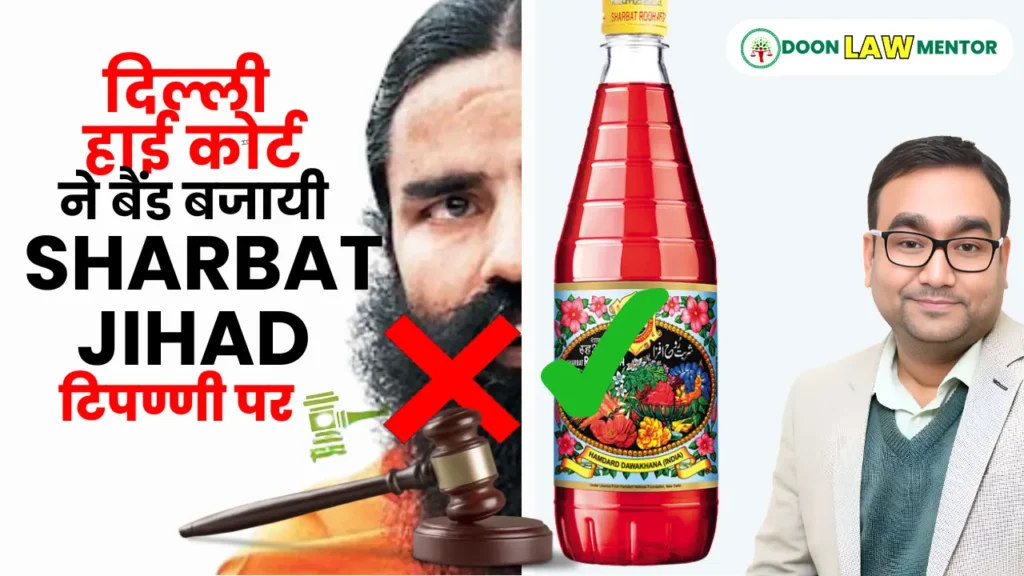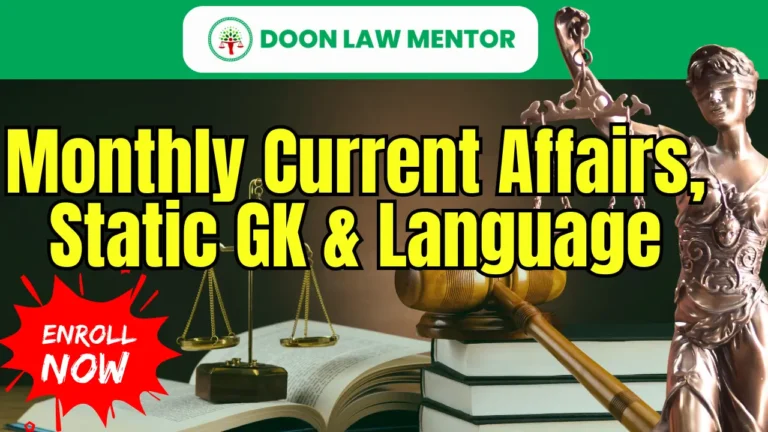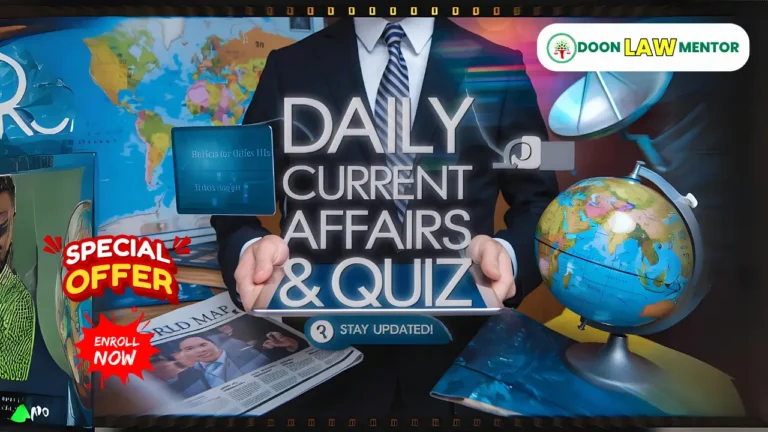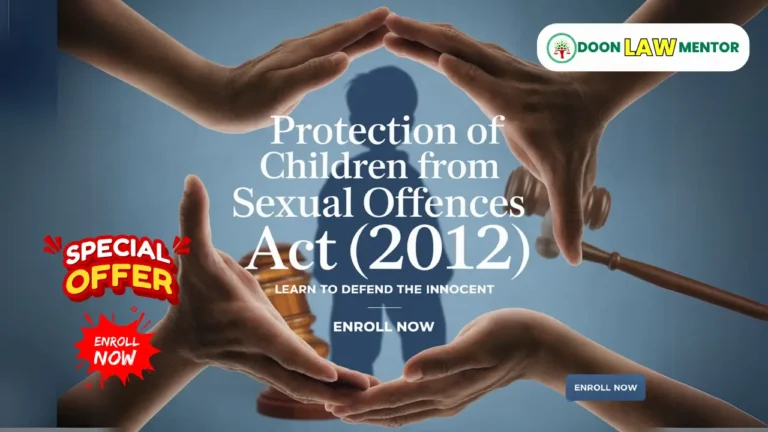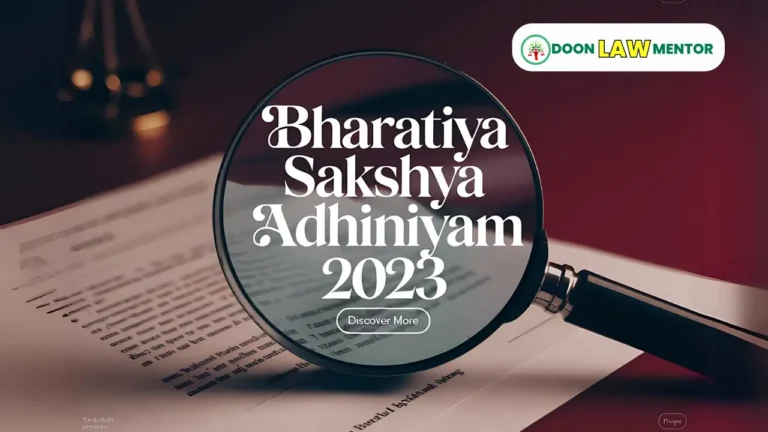The Delhi High Court, in the case of Hamdard National Foundation India v. Patanjali Foods Limited & Anr. (2025), ordered Baba Ramdev to take down videos and advertisements containing his controversial “Sharbat-Jihad” remarks against Rooh Afza, a popular drink by Hamdard. This blog provides a detailed analysis of the Sharbat-Jihad Remarks Case Delhi High Court 2025, covering the court proceedings, legal arguments, and implications for Judiciary, APO, and JLO aspirants preparing for 2025 exams.
Table of Contents
Introduction
On 22 April 2025, the Delhi High Court delivered a significant ruling in the case of Hamdard National Foundation India v. Patanjali Foods Limited & Anr., addressing the controversial “Sharbat-Jihad” remarks made by Yoga guru Baba Ramdev against Hamdard’s iconic drink, Rooh Afza. The court, presided over by Justice Amit Bansal, sharply criticized Ramdev’s communal remarks, labeling them “indefensible” and stating that they “shocked the conscience of the court.” Following the court’s stern warning, Ramdev agreed to take down all advertisements, videos, and social media posts targeting Rooh Afza, marking a pivotal moment in the ongoing legal battle between Hamdard and Patanjali.
For Judiciary, APO, and JLO aspirants preparing for 2025 exams, the Sharbat-Jihad Remarks Case Delhi High Court 2025 offers valuable insights into the intersection of evidence law, hate speech, and judicial oversight. This blog provides a detailed analysis of the case, including the background of the controversy, court proceedings, legal arguments, the court’s ruling, and its relevance to the Bharatiya Sakshya Adhiniyam 2023 (BSA). Let’s dive into this high-profile case and explore its implications for your exam preparation.
Background of the ‘Sharbat-Jihad’ Controversy
The Remarks by Baba Ramdev
The controversy erupted on 3 April 2025, when Baba Ramdev, while promoting Patanjali’s new product, Gulab Sharbat, made controversial remarks targeting Hamdard’s Rooh Afza, a popular rose-flavored drink manufactured by Hamdard National Foundation India for over a century. In a promotional video posted on Patanjali Products’ social media platforms, Ramdev claimed, without explicitly naming Hamdard, that “a company selling sharbat uses the money earned to build mosques and madrasas.” He further stated, “If you drink that sharbat, madrasas and mosques will be built. But if you drink this [Patanjali’s rose sharbat], gurukuls will be built, Acharya Kulam will be developed, Patanjali University will expand, and the Bharatiya Shiksha Board will grow.” Ramdev coined the term “Sharbat-Jihad,” drawing a parallel with “love jihad,” and urged consumers to “protect themselves from this sharbat jihad” by choosing Patanjali products. He also compared other soft drinks to “toilet cleaners,” alleging they were poisonous
Public and Political Backlash
The video quickly went viral, sparking widespread outrage for its communal undertones. Critics labeled the remarks as a “communal dog whistle” targeting Muslims and inciting economic boycotts, accusing Ramdev of promoting religious hatred to boost Patanjali’s sales [Web ID: 15]. On 15 April 2025, senior Congress leader Digvijaya Singh filed a police complaint in Bhopal against Ramdev, seeking action under Sections 196(1)(a) and 299 of the Bharatiya Nyaya Sanhita (BNS) 2023 for promoting religious enmity, as well as provisions of the Information Technology Act. Singh alleged that the remarks were intended to hurt religious sentiments and unfairly target a Muslim-owned company
Ramdev initially defended his remarks, claiming on 18 April 2025 that he had not named any specific brand or community. He stated, “I haven’t taken anybody’s name, but the Rooh Afza people thought the ‘sharbat jihad’ comment was aimed at them… this means they are doing this ‘jihad’,” further escalating the controversy
Hamdard’s Response and Legal Action
Hamdard National Foundation India, a company engaged in manufacturing Unani and Ayurvedic medicines, oils, syrups, and beverages like Rooh Afza since 1907, approached the Delhi High Court, filing a trademark disparagement suit against Patanjali Foods Limited and Baba Ramdev. Hamdard sought the immediate removal of the videos and social media posts containing Ramdev’s remarks, arguing that they were defamatory, communal, and damaging to the brand’s reputation, which has been built over a century
Delhi High Court Proceedings on 22 April 2025
Hamdard’s Arguments: A Case Beyond Disparagement
Senior Advocate Mukul Rohatgi, representing Hamdard, argued before Justice Amit Bansal that Ramdev’s remarks went far beyond mere disparagement of Rooh Afza as a product. He submitted that the case involved a “communal divide” and was akin to hate speech, lacking protection under the law of defamation. Rohatgi highlighted the following points:
- Ramdev’s use of the term “Sharbat-Jihad” attacked Hamdard on the basis of religion, as the company is owned by members of the Muslim community, a fact Ramdev exploited to incite communal sentiments.
- The remarks were not just commercial disparagement but an attempt to create a communal divide, exacerbating existing tensions in the country. “We have enough problems in this country already,” Rohatgi emphasized, arguing that such statements should not be allowed even for a moment.
- Ramdev’s comments were part of a pattern of controversial behavior, as he had previously faced strictures from the Supreme Court for targeting allopathy. In 2024, the Supreme Court initiated suo motu contempt proceedings against Ramdev and Acharya Balkrishna for misleading advertisements about Patanjali’s Coronil product, requiring a public apology for violating court undertakings.
- Rohatgi noted that Ramdev had also targeted another company, Himalaya, allegedly for its Muslim ownership, indicating a broader pattern of communal targeting
- He urged the court to take a “hard hand” to “nip this in the bud,” emphasizing the need for immediate action to prevent further harm to Hamdard’s reputation and communal harmony
Senior Advocate Sandeep Sethi, also representing Hamdard, added that Ramdev should not target the religion of company founders, asserting that Hamdard was a “custodian of humanity,” not a specific religion .
Court’s Initial Reaction: “Shocks the Conscience of the Court”
Justice Amit Bansal expressed strong disapproval of Ramdev’s remarks, stating, “It shocks the conscience of the court. This is indefensible.” He further remarked, “I couldn’t believe my eyes and ears when I saw this ,” highlighting the gravity of the communal slurs used by Ramdev. The court warned that a “strong order” would be issued if Ramdev did not take immediate action to address the issue, reflecting the judiciary’s concern over the potential for such statements to incite communal discord
Initially, a proxy counsel appeared for Ramdev, requesting a passover due to the unavailability of the main counsel. However, Justice Bansal insisted that the main counsel appear by noon, indicating that failure to do so would result in a “very strong order”
Patanjali’s Response: Agreement to Take Down Content
Following the court’s sharp criticism, Senior Advocate Rajiv Nayar appeared on behalf of Patanjali Foods Limited and Baba Ramdev. Nayar informed the court that he had advised his clients to take down all impugned advertisements, whether in print or video format, targeting Rooh Afza. He stated, “I have advised. We are pulling down the videos,” assuring immediate compliance with the court’s directive
Nayar further submitted that Ramdev and Patanjali were not against any religion, requesting that the court record this stance in its order. Justice Bansal responded that such an assurance could not be verbal and must be formalized through an affidavit. The court directed Ramdev to file an affidavit within five days, undertaking that he would not issue any statements, advertisements, or social media posts in the future that aggrieve Hamdard.
Court’s Final Order and Next Steps
Justice Bansal ordered the immediate removal of all offending content, stating, “Take down immediately.” The court granted Ramdev five days to file the affidavit and scheduled the next hearing for 1 May 2025, ensuring continued oversight of the case. The affidavit was to explicitly state that Ramdev would refrain from making similar statements or disparaging remarks against Hamdard in the future.
Nayar also argued that while Ramdev would comply with the directive regarding product disparagement, he should not be stopped from expressing his political views. Justice Bansal responded, “He can hold these opinions in his head, need not express them,” emphasizing that such communal remarks were unacceptable in a public forum.
Legal and Social Implications of the Case
Legal Implications
- Hate Speech and Communal Divide: The court’s observation that Ramdev’s remarks were akin to hate speech highlights the judiciary’s role in curbing statements that incite communal discord. Under Section 196(1)(a) of the BNS 2023, promoting enmity between religious groups is a punishable offense, aligning with Digvijaya Singh’s complaint against Ramdev .
- Trademark Disparagement: Hamdard’s suit underscores the legal principle that commercial disparagement, especially when laced with communal overtones, can be actionable. The court’s swift action to order the removal of the content reflects its commitment to protecting brand reputation and preventing unfair trade practices.
- Judicial Oversight of Public Figures: The case demonstrates the judiciary’s willingness to hold public figures accountable for their statements, especially when they have a wide-reaching impact. Ramdev’s history of legal scrutiny, including the Supreme Court’s 2024 contempt proceedings, reinforces the need for responsible public discourse .
Social Implications
- Communal Harmony: Ramdev’s remarks, by targeting a Muslim-owned company and using terms like “Sharbat-Jihad,” risked exacerbating communal tensions in India, a country with a history of religious diversity and occasional strife. The court’s intervention sends a strong message against such divisive rhetoric .
- Consumer Awareness and Corporate Responsibility: The controversy highlights the ethical responsibility of companies like Patanjali to avoid communal marketing tactics. Hamdard’s defense of its legacy as a “custodian of humanity” (not a specific religion) resonates with India’s pluralistic ethos [Web ID: 4].
- Public Sentiment: Posts on X reflected polarized reactions, with some users condemning Ramdev’s remarks as dangerous and divisive, while others, including Ramdev, defended them as not targeting any specific brand [Post ID: 1] [Post ID: 5]. This polarization underscores the need for judicial clarity in such cases.
Connection to Bharatiya Sakshya Adhiniyam 2023
The case’s reliance on prior judgments (Section 37) and electronic evidence (Section 65B) illustrates the practical application of the BSA 2023 in modern litigation. Additionally, the court’s directive to file an affidavit reflects its emphasis on ensuring future compliance, aligning with principles of fairness and accountability in evidence law.
Why This Case Matters for Judiciary, APO, and JLO Aspirants
For Prelims Preparation
- Key Facts to Memorize:
- Case Title: Hamdard National Foundation India v. Patanjali Foods Limited & Anr. (2025).
- Date of Remarks: 3 April 2025; Court Order: 22 April 2025; Next Hearing: 1 May 2025.
- Court’s Observation: “Shocks the conscience of the court, indefensible.”
- Key Sections: Section 37 (prior judgments), Section 38 (fraud challenge), Section 65B (electronic records).
- Constitutional Provisions:
- Article 19(1)(a): Freedom of speech, but restricted under Article 19(2) for public order (hate speech).
- Article 21: Right to a fair trial—judicial oversight ensures fairness.
- General Awareness:
- Parties: Hamdard, Patanjali, Baba Ramdev.
- Advocates: Mukul Rohatgi (Hamdard), Rajiv Nayar (Patanjali).
- Engagement Prompt: These facts are prelims gold—let’s see mains preparation next!
For Mains Preparation
- Essay Topics:
- “Judicial Oversight of Hate Speech in Commercial Disputes: Lessons from Hamdard v. Patanjali 2025.”
- “Balancing Freedom of Speech and Communal Harmony: A Case Study of the Sharbat-Jihad Controversy.”
- Case Scenarios:
- Analyze a trademark disparagement case where communal remarks are made, using Section 37 to admit prior judgments and Section 65B for video evidence.
- Discuss the court’s role in curbing hate speech under Article 19(2), citing the Sharbat-Jihad case.
- Contemporary Relevance:
- Link to Waqf Amendment Act 2024 controversy: Judicial review of communal issues.
- Use of digital evidence (Section 65B) in modern litigation.
- Engagement Prompt: Essays that impress—let’s see interview strategies next!
For Interview Preparation
- Constitutional Insight:
- Discuss how the court balanced Article 19(1)(a) (freedom of speech) with Article 19(2) (public order) in the Sharbat-Jihad case.
- Explain the judiciary’s role in preventing communal discord, citing Hamdard v. Patanjali.
- Recent Developments:
- Highlight the Sharbat-Jihad case as an example of judicial intervention in hate speech.
- Discuss Ramdev’s history of legal scrutiny (e.g., Supreme Court contempt in 2024).
- Balanced Perspective:
- Debate freedom of speech vs. hate speech: Should Ramdev’s remarks be protected under Article 19(1)(a)?
- Analyze the role of corporate responsibility in avoiding communal marketing tactics.
- Engagement Prompt: Interview-ready—let’s see practical applications for exams!
Practical Exam Application
- Objective Questions:
- Expected MCQs: Case title (Hamdard v. Patanjali), court’s observation (“shocks the conscience”), Section 37 application.
- Example: “In which case did the Delhi High Court slam Baba Ramdev for ‘Sharbat-Jihad’ remarks? (A) Hamdard v. Patanjali (B) Himalaya v. Patanjali (C) Rooh Afza v. Ramdev (D) None of these.”
- Subjective Answers:
- Case-Based Questions: Analyze a hate speech case using prior judgments (Section 37) and challenge for fraud (Section 38).
- Essay: “Discuss the judiciary’s role in curbing communal remarks in commercial disputes under BSA 2023.”
- Broader Relevance:
- Evidence Law: Sections 37, 38, and 65B are key for understanding judicial evidence.
- Constitutional Law: Article 19(1)(a) vs. Article 19(2) in hate speech cases.
- Engagement Prompt: Your exam prep just got easier—time to conclude!
Broader Exam Relevance
- Evidence Law: The case illustrates the application of Sections 37, 38, and 65B of the BSA 2023 in modern litigation, particularly for digital evidence and prior judgments.
- Constitutional Linkages:
- Article 19(1)(a): Freedom of speech, restricted by Article 19(2) for public order.
- Article 21: Right to a fair trial—court ensures fairness by ordering content removal.
- Contemporary Issues: Hate speech, communal harmony, and corporate responsibility in marketing.
- Engagement Prompt: A must-know for 2025 exams—time to take action!
Conclusion
The Hamdard National Foundation India v. Patanjali Foods Limited & Anr. (2025) case marks a significant judicial intervention in addressing communal remarks in commercial disputes, with the Delhi High Court ordering Baba Ramdev to take down videos and advertisements containing his “Sharbat-Jihad” remarks against Rooh Afza. The court’s sharp criticism of the remarks as “indefensible” and “shocking to the conscience” underscores the judiciary’s commitment to preventing communal discord and upholding fairness in legal proceedings. The case’s reliance on prior judgments (Section 37) and electronic evidence (Section 65B) of the Bharatiya Sakshya Adhiniyam 2023 highlights its relevance to evidence law, while its implications for hate speech and corporate responsibility resonate with constitutional principles like Articles 19 and 21.
For Judiciary, APO, and JLO aspirants, the Sharbat-Jihad Remarks Case Delhi High Court 2025 offers a rich case study for understanding evidence law, judicial oversight, and communal harmony issues. By integrating these insights into your preparation, you can confidently tackle prelims MCQs, mains essays, and interview questions. Start leveraging this case to enhance your 2025 exam readiness and build a strong foundation for your legal career!
Call-to-Action
Master the Sharbat-Jihad Remarks Case Delhi High Court 2025 for your 2025 exams! Join Doon Law Mentor’s Courses for expert guidance. Follow @doonlawmentor on Instagram for daily updates!
FAQs
- What is the Sharbat-Jihad Remarks Case Delhi High Court 2025?
It’s a case where Hamdard sued Patanjali and Baba Ramdev for communal remarks against Rooh Afza, leading to a court order for video removal. - Who ordered the removal of the Sharbat-Jihad videos in 2025?
Justice Amit Bansal of the Delhi High Court ordered the removal. - What did Baba Ramdev claim in the Sharbat-Jihad remarks?
He claimed a company (implied as Hamdard) used sharbat profits to build mosques and madrasas, calling it “Sharbat-Jihad.” - What did the Delhi High Court say about Ramdev’s remarks?
The court called them “indefensible” and said they “shocked the conscience of the court.” - Who represented Hamdard in the Sharbat-Jihad case?
Senior Advocate Mukul Rohatgi represented Hamdard. - Who represented Patanjali in the Sharbat-Jihad case?
Senior Advocate Rajiv Nayar represented Patanjali and Baba Ramdev. - What did the court require Ramdev to file?
An affidavit undertaking not to issue similar statements or ads in the future, within five days. - How does BSA 2023 apply to the Sharbat-Jihad case?
Sections 37 (prior judgments), 38 (fraud challenge), and 65B (electronic records) are relevant for evidence in the case. - What constitutional principles are involved in the case?
Article 19(1)(a) (freedom of speech) vs. Article 19(2) (public order), and Article 21 (fair trial). - Why is the Sharbat-Jihad Remarks Case important for aspirants?
It’s key for evidence law, hate speech, and communal harmony topics in Judiciary exams.
#DoonLawMentor #SharbatJihad #BabaRamdev #RoohAfza #DelhiHighCourt #PatanjaliCase #LegalNews #JudiciaryPrep #HamdardVsPatanjali #HateSpeech #LawStudentsIndia #communalharmony #sharbatjihadcontroversy #delhihighcourtorder

